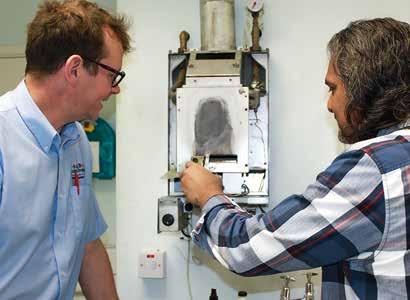
4 minute read
Training
Upskilling the next generation
With one-fifth of gas engineers potentially retiring in the next five years, Mark Krull from Logic4training looks at how companies can invest in the next generation of their business and build resilience.
Many heating engineer businesses will be looking for ways to adapt to growing change in the heating sector. Consumer interest in renewables is slowly growing, boosted by the Heat and Buildings Strategy and the upcoming Boiler Upgrade Scheme – but there will be strong demand for installation, maintenance and servicing of gas appliances for many years to come.
The building services engineering (BSE) sector has been suffering from a skills shortage for many years and is known to have an ageing workforce. In recent decades, there just haven’t been enough apprentices and trainees to replace those reaching retirement age, with many students choosing academic routes rather than trades.
While the pandemic has in some ways exacerbated this by creating barriers to training and practical working, I hope that we will see a renewed enthusiasm for the trades in years to come. Government support will be crucial in building the installer base for net zero 2050, but a suitable strategy for tackling the skills shortage and delivering decarbonisation remains to be seen.
Develop your business
Investing in ongoing training for employees is one of the best ways for heating engineers to remain flexible and dynamic enough to respond to emerging markets and changing consumer demand. Times of change are the ideal opportunity to take a look at your team for untapped potential.
Do you have a plumber’s mate who is keen to get some accredited qualifications under their belt? Or an experienced plumber ready to become Gas Safe registered? By injecting new skills from the bottom up, business owners can free up experienced engineers to expand into related and growing sectors, such as heat pumps, solar thermal or other renewable technologies.
Training routes
Apprenticeships have been the traditional route into the sector: however, alternative pathways are designed for anyone, of any age or experience, with a desire to build on their skills and take the next step in their career. Ultimately, those with existing experience of plumbing and gas heating installation are best placed to either upskill or re-skill to fill gaps in the workforce.
Plumber’s mate to qualified
plumber: Plumbing is a great place to start: it’s a versatile career where new entrants can learn all the key skills required for a successful career in the skilled trades – attention to detail, knowledge of building and construction, a technical mindset and a problem-solving approach – as well as valuable on-the-tools experience, working under the supervision of an experienced engineer.
The basic plumbing qualification is a Level 2 Diploma in Plumbing and Heating, which covers a range of specialist skills, including design and installation of hot and cold water systems and basic electrics, enabling candidates to work on bathroom installations, including sanitary and associated pipework.
This route is ideal for young
people who have little or no experience of working in the sector, providing basic skills for working and a strong foundation for further training in related industries, such as gas engineering.
Qualified plumber to Gas Safe
registration: The Managed Learning Programme (MLP) route is designed for new entrants and operatives with transferable skills, such as experience working as a plumber, kitchen fitter or alongside a Gas Safe registered engineer, who have not completed their ACS before. For businesses looking to train up employees, the MLP is a bigger investment in terms of time and money but, with an additional Gas Safe registered engineer on the team, you should see a good return on investment.
Training takes place in centres, both in classrooms and practical training bays, and candidates must also complete a portfolio of gas work under the supervision of a Gas Safe registered engineer. This mix of centre and site-based experience brings candidates up to the required standard to undertake their ACS and register with Gas Safe.
Gas Safe and beyond:
Ultimately, gas is just a fuel and registered Gas Safe engineers have the best skills, knowledge and experience to deliver low-carbon heating technologies on a mass scale. Upskilling to heat pumps is a relatively simple task for those with prior heating experience and could open businesses up to new markets by bringing skills in-house.
Support the next generation
New entrants are desperately needed to plug the skills gap: however, there is also a strong demand for candidates with transferable skills and related experience. Although your existing employees might lack the specific skills you seek, they can build on their knowledge and benefit you both. Those who are already embedded in the culture of your business will progress more quickly, increasing productivity more efficiently and justifying the cost of training. n
Logic4training offers four plumbing and gas engineering training packages designed for all levels and abilities.







